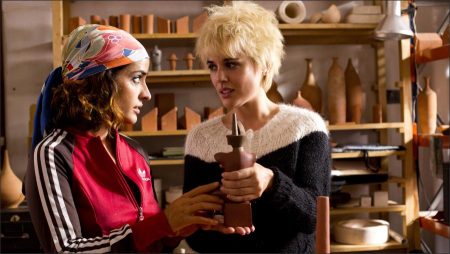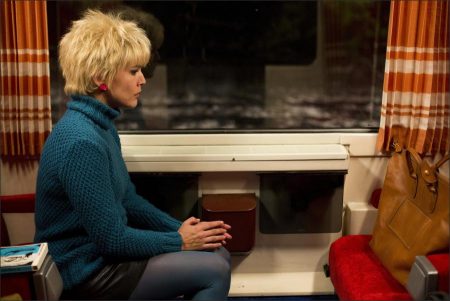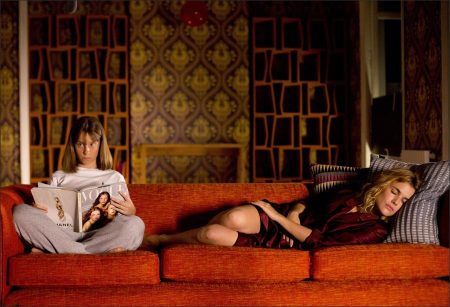Julieta (Emma Suarez) is a middle-aged woman living in Madrid with her boyfriend Lorenzo. Both are going to move to Portugal when she casually runs into Bea, former best friend of her daughter Antia, who reveals that this one is living in Switzerland married and with three children. With the heart broken after 12 years of total absence of her daughter, Julieta cancels the journey to Portugal and she moves to her former building, in the hope that Antia someday communicates with her sending a letter.
Alone with her thoughts, Julieta starts to write her memories to confront the pain of the events happened when she was a teenager (Adriana Ugarte) and met Xoan, a Galician fisherman. Falling in love with him, Julieta divides her time between the family, the job and the education of Antia until a fatal accident changes their lives. Slowly decaying in a depression, Julieta is helped by Antia and Bea, but one day Antia goes missing suddenly after a vacation with no clues about where to find.
Julieta is a Spanish film written and directed by Pedro Almodóvar based on three short stories from the book Runaway (2004) by Alice Munro. The film marks Almodóvar’s 20th feature and stars Emma Suárez and Adriana Ugarte as older and younger versions of the film’s protagonist, Julieta, alongside Daniel Grao, Inma Cuesta, Darío Grandinetti, Michelle Jenner and Rossy de Palma.
The film opened on 8 April 2016 in Spain to generally favourable reviews and a smaller box-office opening than most of the director’s films. It made its international debut at the 2016 Cannes Film Festival, where it was selected to compete for the Palme d’Or, and will be released across the world throughout the remainder of 2016. Julieta has made over $14 million worldwide. It was selected by the Academia de las Artes y las Ciencias Cinematográficas de España as the Spanish entry for the Best Foreign Language Film at the 89th Academy Awards.
Review: Almodóvar’s five-star return to form
Spanish auteur Pedro Almodóvar’s latest, his most moving and entrancing work since 2006’s Volver, is a sumptuous and heartbreaking study of the viral nature of guilt, the mystery of memory and the often unendurable power of love. At times, the emotional intrigue plays more like a Hitchcock thriller than a romantic melodrama, with Alberto Iglesias’s superb Herrmannesque score (the director cites Toru Takemitsu, Mahler and Alban Berg as influential) heightening the noir elements, darkening the bold splashes of red, blue and white.
Three short stories from the Canadian author Alice Munro’s 2004 volume Runaway provide the source material, but the spirit of Patricia Highsmith looms large as strangers on a train fuel the circling narrative (one character even observes that he is becoming a Highsmith obsessive). I was also startled to find echoes of George Sluizer’s Dutch-French 1988 chiller Spoorloos in the depiction of a life defined by the disappearance of a loved one, although there is a tenderness here wholly lacking from Sluizer’s altogether more unforgiving work.
Emma Suárez is fabulous as Julieta, a beautiful, erudite, middle-aged woman leaving Madrid for Portugal to start a new life with Lorenzo (Talk to Her’s Darío Grandinetti). But a chance meeting with a childhood friend of her estranged daughter, Antía, sideswipes Julieta’s future plans. Instead of moving forward, she returns to the apartment block where she and Antía once lived, to write the story of their tragic, quasi-mythical odyssey.
Transported back to the 80s, we meet the younger Julieta, now played with equal vigour by Adriana Ugarte, one of the film’s many talismanic doublings. For this spiky-haired classics teacher (Greek myth flows through these stories), a nocturnal train journey provides a fateful brief encounter with love and death, laying the tracks for all that is to come: her relationship with Galician fisherman Xoan (Daniel Grao), the birth of their beloved daughter, Antía, and the predestined separation from both.
Almodóvar initially planned to use Munro’s stories as the basis of an English-language feature, yet bringing the material to Spain puts the writer-director on fertile home ground. As with 1997’s Live Flesh and 2011’s The Skin I Live In, Julieta may have a literary source but the result is entirely Almodóvar’s own. We open on a close-up of the undulating folds of a crimson dress, resembling both a heart and flower, signalling the thicker-than-water themes that will course through the narrative.
As Julieta moves back and forth through time and space, Sonia Grande’s costumes and Antxón Gómez’s production design tell their own story – the stark lines of a room in which the past has been erased contrasting with the noisy clutter of a space filled with memories; the fragmented patterns of a gown matching the jagged edges of a torn photograph that Julieta sticks together to face her past; a blue garment framing a crimson cake that is ritually binned as another lonely birthday passes.
After the exhaustingly camp sociopolitical satire of 2013’s I’m So Excited!, it’s a relief to find Almodóvar returning to the more introspective themes of such superior work as All About My Mother or The Flower of My Secret. Yet for all the director’s avowed “desires for containment” in a drama that he insists contains no “humour or any mixing of genres”, Julieta still manages to unite the disparate elements of Almodóvar’s unruly career. As the current BFI Southbank retrospective reminds us, he’s come a long way from the punky bawdiness of Pepi, Luci, Bom.
There is a Bergmanesque quality to Almodóvar’s focus on Suárez’s face in Julieta which speaks volumes about his journey from enfant terrible to elder statesman. As portrayed by Ugarte, however, the younger Julieta would not have seemed out of place in Women on the Verge of a Nervous Breakdown, Tie Me Up! Tie Me Down! or High Heels, a reminder that the ghosts of Almodóvar’s back catalogue (highlighted here by the iconic presence of longtime muse Rossy de Palma) are as present as the past lives that haunt our heroine.
Deftly conjoining the two central performances is a breathtakingly simple sequence that encapsulates Almodóvar’s genius. As a young Antía dries her devastated mother’s hair, Ugarte’s face disappears beneath a towel and re-emerges as that of Suárez, Julieta’s youthful visage transformed by grief. Whether through coma, depression or dementia, this is a drama littered with characters living an underworld existence, trapped by the great silence that is the true villain of the piece. Having been swept along by Almodóvar’s vision, I felt that silence deserved to be broken by tumultuous applause.
Julieta
Directed by: Pedro Almodóvar
Starring: Adriana Ugarte, Michelle Jenner, Rossy de Palma, Emma Suárez, Inma Cuesta, Pilar Castro, Nathalie Poza, Agustín Almodóvar
Screenplay by: Pedro Almodóvar, Alice Munro
Production Design by: Antxón Gómez
Cinematography by: Jean-Claude Larrieu
Film Editing by: José Salcedo
Costume Design by: Sonia Grande
Art Direction by: Carlos Bodelón, Federico García Cambero
Music by: Alberto Iglesias
MPAA Rating: R for some sexuality /nudity.
Studio: Warner Bros. Pictures
Release Date: December 23, 2016
Views: 323







